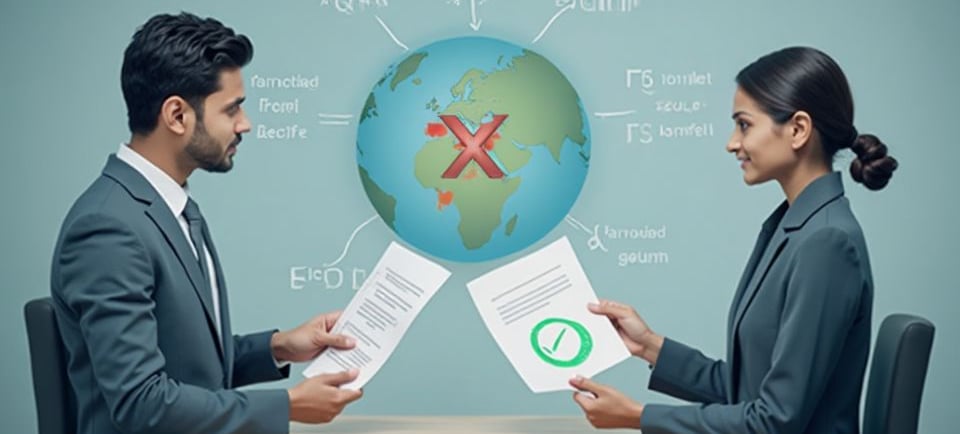Can Laminated Documents Be Accepted by Embassies? Myths, USA Job Policies & Reality for Indians
Learn the truth about laminated documents in embassy verification. Discover USA’s latest job policies for Indians, overseas job opportunities, and why laminated papers create problems abroad.
ABROAD JOB
Viral Gala
9/21/20252 min read


🚨 Myth vs. Reality: Will Your Laminated Documents Kill Your Dream Job Abroad?
You're a skilled Indian professional, and the world—from the tech hubs of the USA to the construction sites in the Gulf—is opening its doors wider than ever. That job offer in Toronto or that H-1B transfer to Silicon Valley feels so close you can taste it!
You've done everything right... almost.
As you gather your educational certificates and experience letters, there's one small, common mistake that could suddenly turn your Green Light into a Red Flag: lamination.
Let's clear the air and separate the myths from the critical reality: Embassies, including those for the USA, UK, and Canada, almost universally reject laminated documents.1
1. The Reality Check: Why Laminating Is a Security Threat, Not a Safety Measure 🚩
You laminated your degree to protect it from wear and tear. That was an act of care. But for verification authorities, that plastic film is an act of obstruction.
❌ THE MYTH✅ THE EMBASSY REALITY (Why Trust is Broken)"Lamination keeps my document safe and clean."It Hides the Proof: Verification officers must be able to see, feel, and sometimes test the original paper, the raised seal (embossing), and the ink quality. Lamination blocks these crucial security checks."It’s just a piece of plastic, what’s the big deal?"It Raises a Red Flag: Laminated papers instantly create a suspicion of tampering. Officials must confirm no grades or details were altered before the plastic was sealed."It doesn’t matter, they only need a scan anyway."It Stops Legalization: For your visa, documents require Attestation or an Apostille stamp. Lawyers and government officials cannot stamp the plastic, rendering your certificate legally invalid for use abroad.
The cold hard truth: If your documents are laminated, your application may be instantly flagged, leading to a request for a fresh original—and significant, frustrating delays.
2. 2025 Opportunities: Don't Let a Paperwork Blunder Slow You Down ⏱️
The market is hot for skilled Indian talent. Your document trail must be flawless:
USA (H-1B/L-1): Tech, AI, and Finance jobs need clear, verifiable degrees.
Canada (Express Entry): Requires authenticated Educational Credential Assessments (ECA).2
Gulf Countries (Employment): Demand mandatory attestation on original papers.
In every case, laminated documents will be the roadblock that makes you miss the flight. This is why international legalization is governed by treaties like the Apostille Convention (Wikipedia).
3. Your Proactive Checklist: Fixing the Lamination Problem
If your key certificates are laminated, don't despair—and don't grab the iron!
Stop the DIY: Homemade removal attempts (using heat or blades) will likely ruin the original ink and paper permanently. This is why we caution against general instructions like those found online: How to remove lamination form paper (YouTube Caution).
Go Professional: Use a trusted, specialized delamination service. They use controlled technology to safely restore your document to its original, verifiable state.
Use Safe Storage: For all future documents, use clear, protective plastic sleeves or folders. They protect the paper without permanently sealing it.
Your journey abroad should be exciting, not frustrating. By ensuring your documents are $100\%$ original and verifiable, you are taking control of your process and clearing the path to your dream job in 2025.
Need a safe, expert solution for Lamination Removal?
We specialize in restoring the integrity of your documents to make them embassy-ready.
Contact Viral Gala, Document Integrity Specialist: +91 99203 22366
Lamination Removal Site: https://www.howtoremovelamination.com/
360 VR Photography: 360vrphotography.com and 360vrphotography.in
